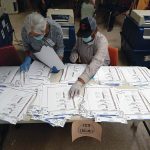
Guest Column: Feds coordinating response to aid tribes’ fight against COVID-19
By Michael D. Weahkee, Jeannie Hovland and Peter Gaynor
Earlier this month, the president visited Indian Country to reemphasize his support for Native communities impacted by COVID-19.
The COVID-19 response in Indian Country is critical if we are to slow the spread and minimize the impact that this global pandemic is having on their communities and economies.
The Federal Emergency Management Agency, the Administration for Native Americans, and the Indian Health Service are working closely together and with tribes, tribal and urban Indian organizations, federal, state and local partners and volunteer organizations to support the distinct needs of American Indian and Alaska Native communities.
We are committed to ensuring the recovery of health, wellbeing, and economic prosperity in Indian Country.
Each Native community has different risk factors and resources to respond effectively to this pandemic. Through our work on the White House Indian Country COVID-19 Response Team, we are addressing these important issues expressed by our communities, including the Navajo Nation.
For instance, the federal government is working with the Navajo Nation to recommend solutions, identify resources and implement plans to expand water access. These actions will potentially assist in reducing the spread of the illness and lessen the burden on health care delivery infrastructure.
The White House and Congress have provided overwhelming support. The president signed the CARES Act into law, providing $8 billion to address coronavirus preparedness, response, and recovery for tribal governments. This means significant new resources to support the COVID-19 response across Indian Country.
As a public service, the Navajo Times is making all coverage of the coronavirus pandemic fully available on its website. Please support the Times by subscribing.
How to protect yourself and others.
Why masks work. Which masks are best.
Resources for coronavirus assistance
Additionally, the CARES Act provided over $1 billion to IHS to support tribes, tribal organizations, and urban Indian organizations in their COVID-19 response efforts. The total allocation of COVID-19 funds provided through the IHS Navajo Area and to Navajo Nation by FEMA and IHS is $116.3 million.
Additionally, reimbursement to tribes, tribal and urban organizations is available from FEMA. All tribal emergency protective measures that help save lives are eligible for 75 percent federal reimbursement thanks to President Trump’s nationwide emergency declaration.
We have worked closely to provide relief – including the delivery of 50 ventilators to the Navajo Nation, which has seen significant impacts from the coronavirus.
The federal government has also deployed two Disaster Medical Assistance Teams and constructed two multi-bed federal medical stations on the Navajo Nation and one station in Gallup. And this week, the U.S. Public Health Service Commissioned Corps sent more than 45 specialized officers with clinical, scientific, and public health experience to IHS facilities in Chinle and Shiprock to provide medical support.
The IHS Navajo Area and the IHS National Supply Service Center are using every available avenue to secure sufficient personal protective equipment and supplies to meet demands.
FEMA and IHS have also deployed two personnel to work in the Navajo Nation Health Command Operations Center, allowing us to better meet the Navajo Nation’s needs and coordinate resources and support communications.
IHS is working closely with FEMA, using a whole-of-America response, and focusing on getting supplies to tribal hot spots and ensuring tribal needs are met. FEMA and IHS have delivered personal protective equipment to the Navajo Nation such as gloves, faces shields, Tyvek suits and approximately 580,000 N95 masks.
To maximize availability of testing, the IHS Navajo Area utilizes all available methods of testing for COVID-19, including state or regional public health labs, in-house point-of-care testing, commercial labs that have sufficient processing capacity that some Indian health-care sites may not have, and academic partners.
IHS was given priority access to rapid point-of-care COVID-19 test systems as part of a White House effort to expand testing in rural and remote areas. To date, the IHS Navajo Area has received 15 ABBOTT ID rapid test analyzers and approximately 10,700 tests.
In an effort to maximize capacity to treat acutely ill patients, to conserve supplies, and minimize risk of exposure, IHS is encouraging the use of telephone visits and telemedicine. The expansion of telehealth means more American Indians and Alaska Natives have access to health care from their home.
The Northern Navajo Medical Center in Shiprock is also working to rapidly deploy telehealth services as needed to respond to the potential surge in hospitalized and critically ill patients. This would allow critical care consultation for patients managed in an IHS intensive care unit, and for critically ill patients receiving care at hospitals before they transfer to a higher level of care.
IHS Navajo Area surge capacity plans also include working with tribal, state and local partners to operate alternate care sites using existing buildings for patients who have been transferred from the hospital but still require some level of medical care. These patients may require oxygen and medications but do not require extensive nursing care or assistance with activities of daily living.
IHS is moving forward to create a national COVID-19 Critical Care Response Team to deploy as needed to provide urgent lifesaving medical care to stabilize and treat patients with suspected or confirmed COVID-19 admitted to an IHS or tribal hospital.
We are grateful for the strong leadership displayed by our tribal partners, who continue to be fierce advocates. We will continue to work with our key stakeholders and support our American Indian and Alaska Native communities.
Jeannie Hovland, Flandreau Santee Sioux, is the commissioner of the Administration for Native Americans, an agency within the U.S. Department of Health and Human Services. Rear Adm. Michael D. Weahkee, Zuni, is the director of the Indian Health Service, an agency within HHS. Pete Gaynor, is administrator of the Department of Homeland Security, Federal Emergency Management Agency.

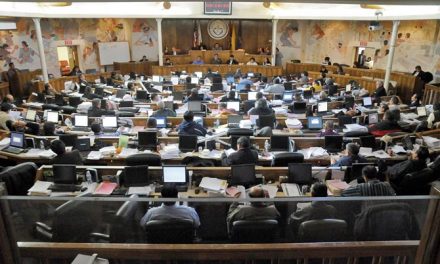
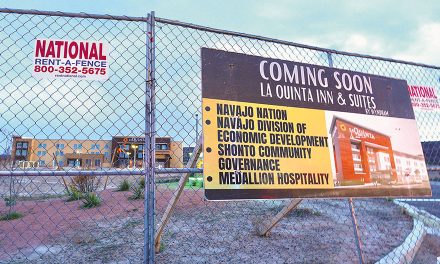
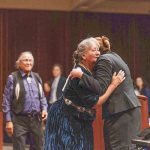
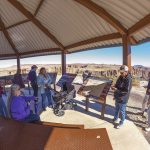



 Highway 264,
Highway 264, I-40, WB @ Winslow
I-40, WB @ Winslow